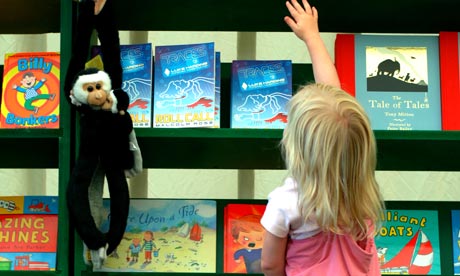When literary events are big business, why should writers perform for nothing?

A young girl reaches for a book at the Cheltenham literature festival. Photograph: Adrian Sherratt/Alamy
Literary festivals are rocking again. The annual migration of the British reading public to church halls, marquees and hotel ballrooms (full disclosure: I've spoken on several occasions in all of these) has become one of the signs of summer, from Folkestone to Edinburgh.
This postwar cultural phenomenon actually began in Cheltenham in 1949. It really boomed after the launch of Hay in 1988. Right now, it's a bonanza that defies commercial gravity. The new festivals launched in 2011 include Chalke Valley, Surrey Heath and Guernsey. Meanwhile, Fenland's Wordfest is sensibly rebranding itself as the Cambridge literary festival.
At present, all told (estimates vary), there are some 250 arts and books festivals in the UK promoting the buzz of live authorship. At the top end, there's a lot of money flying about. Hay, now going global, turns over about £9m-£10m; Edinburgh approaches £2m; Cheltenham £1.49m and Bath £1.3m.
Here's where the sunny picture of Britain's festival paradise begins to darken. Times are hard. Not only is it increasingly difficult, I hear, for festival directors to scare up new funding from festival sponsors, almost all potential media partners (national newspapers such as the Observer and the Telegraph, and commercial broadcasters like Sky), with established alliances, are reluctant to extend their patronage.
The upshot is a trend away from celebrity events of the kind pioneered at Hay and a move towards local programming, local audiences and local media. The Stoke Newington literary festival is a good example. Inspired by a tradition that can be stretched to include Daniel Defoe and Edgar Allan Poe, it has built up a vigorous relationship with the local press (N16 Magazine and the Hackney Gazette). It flourishes precisely because it knows where its bread is buttered. Other excellent festivals that have benefited from thriving local connections include Bath, Buxton, Marlborough and Brighton.
Full piece at The Guardian.
This postwar cultural phenomenon actually began in Cheltenham in 1949. It really boomed after the launch of Hay in 1988. Right now, it's a bonanza that defies commercial gravity. The new festivals launched in 2011 include Chalke Valley, Surrey Heath and Guernsey. Meanwhile, Fenland's Wordfest is sensibly rebranding itself as the Cambridge literary festival.
At present, all told (estimates vary), there are some 250 arts and books festivals in the UK promoting the buzz of live authorship. At the top end, there's a lot of money flying about. Hay, now going global, turns over about £9m-£10m; Edinburgh approaches £2m; Cheltenham £1.49m and Bath £1.3m.
Here's where the sunny picture of Britain's festival paradise begins to darken. Times are hard. Not only is it increasingly difficult, I hear, for festival directors to scare up new funding from festival sponsors, almost all potential media partners (national newspapers such as the Observer and the Telegraph, and commercial broadcasters like Sky), with established alliances, are reluctant to extend their patronage.
The upshot is a trend away from celebrity events of the kind pioneered at Hay and a move towards local programming, local audiences and local media. The Stoke Newington literary festival is a good example. Inspired by a tradition that can be stretched to include Daniel Defoe and Edgar Allan Poe, it has built up a vigorous relationship with the local press (N16 Magazine and the Hackney Gazette). It flourishes precisely because it knows where its bread is buttered. Other excellent festivals that have benefited from thriving local connections include Bath, Buxton, Marlborough and Brighton.
Full piece at The Guardian.
No comments:
Post a Comment